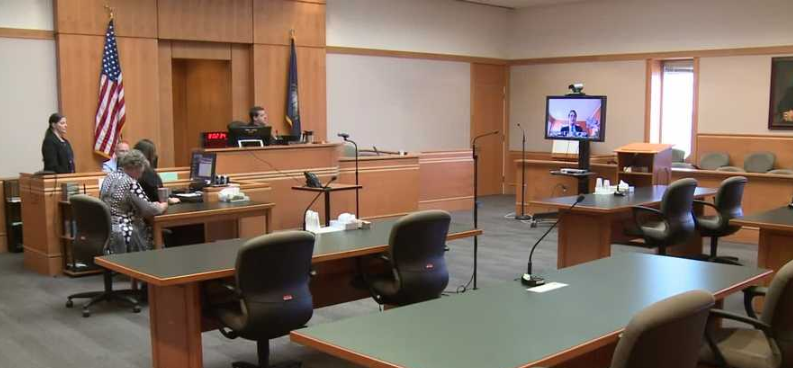By GARRY RAYNO, InDepthNH.org
CONCORD — Lawmakers suing Gov. Chris Sununu over the spending of federal COVID-19 funds contend the governor seeks to bar legislators and taxpayers from contesting any illegal actions on his part in the courts.
They contend in their new filings on Monday that Sununu’s lawyers misinterpreted a 2018 constitutional amendment intended to give taxpayers and legislators standing to challenge governmental actions they believe are unconstitutional or illegal.
The Democratic legislative leadership also asked the court for an expedited declaratory ruling, and to amend their original motion seeking to block Sununu from spending $1.25 billion in federal CARES Act money without Joint Legislative Fiscal Committee approval.
The original suit was dismissed by Hillsborough County North Superior Court Judge David Anderson saying the Democratic legislative leaders lacked standing because no harm had been done.
The judge relied on 2014 state Supreme Court decision that said actual, not hypothetical, harm has to exist before the four lawmakers could proceed with the suit.
In Monday’s filings, attorneys Gregory Silverman, representing Senate President Donna Soucy, and Paul Twomey, representing House Speaker Stephen Shurtleff, argue the 2018 amendment was passed to rectify the 2014 Supreme Court ruling blocking lawsuits against the government without actual harm.
“The Governor’s interpretation of the 2018 amendment is an invitation for the Court to venture into the Looking Glass. He first ignores the very first sentence of the amendment, which foremost grounds general taxpayer standing on the right ‘to an orderly, lawful, and accountable government,’” the attorneys write.
“This right expressly confers standing on ‘any individual taxpayer eligible to vote in the State with no need to ‘demonstrate that his or her personal rights were impaired or prejudiced beyond his or her status as a taxpayer.’”
Under the amendment, the attorneys say eligibility to vote and taxpayer status grants them standing to bring the suit.
They also argue the members of the Fiscal Committee have been denied their right to vote because of the governor’s action to unilaterally decide to accept the federal funds and to spend them.
They claim they have standing to prevent the governor from disenfranchising their statutory voting rights.
“Plaintiffs maintain a cognizable legal interest in preserving the efficacy of their voting rights,” the attorneys wrote. “The result of the Governor’s refusal to recognize the critical legislative roll in appropriating public funds is no mere ‘abstract dilution of institutional legislative power,’ but rather the cancellation of a legal privilege held separately by each member of the Fiscal Committee.”
In an earlier filing, Sununu’s attorneys claim lawmakers want the judge to reconsider his decision without offering proof he overlooked or misapprehended issues of fact or law.
Solicitor General Daniel Will objected to the lawmakers’ motions filed May 1 for an expedited ruling and to make a second amendment to their original complaint and asks the motions be dismissed.
Will says the plaintiffs sought to adjust their legislative standing to the legal principles presented in court’s earlier decision.
“The plaintiffs do not claim that this Court overlooked any points of law concerning legislative standing,” Will writes.
He further argues there is no complaint to amend because it has been dismissed and the lawmakers “seek reconsideration on the basis of factual allegations that have never been before this Court until now.”
And Will says the court would need to agree to reconsider the case before considering an amendment to the original motion.
Anderson’s ruling stated the four legislative leaders did not have standing to bring the suit, but did not rule on the legal issues raised by the two sides.
The lawmakers claim under the constitution and state law Sununu needs legislative approval through the Joint Legislative Fiscal Committee to spend unappropriated federal or state money to combat the spread of the coronavirus and to provide relief to businesses, organizations, people and governments impacted by the COVID-19 epidemic.
Sununu claims a 2002 law passed after the September 11 terrorist attacks gives governors expansive authority during emergencies including the flexibility to spend money where he or she sees fit to protect the public’s health and safety.
Sununu has established the Governor’s Office for Emergency Relief and Recovery to oversee the distribution of the federal money.
Monday the lawmakers again requested a quick decision by the court saying nothing has changed since they first brought the suit.
“The only material change has been that in the three weeks since $1.25 billion in federal CARES Act funds were deposited into the state treasury, the Governor has appropriated two-thirds of this money, or about $850 million, with no involvement from the constitutional branch which always controls the state’s purse strings,” the attorneys write. “The Governor, unsurprisingly, seeks to delay any declaration of what this Court deems the law requires, as the passage of time increasingly moots any declaration in Plaintiffs’ favor.”
Garry Rayno may be reached at garry.rayno@yahoo.com





